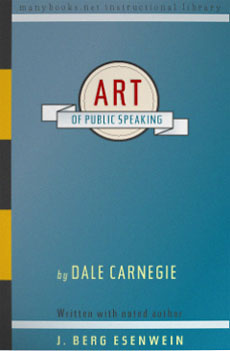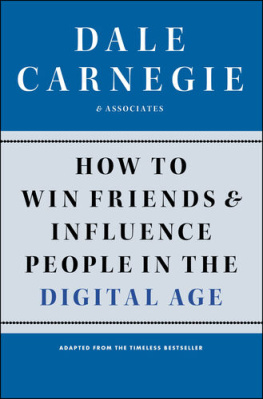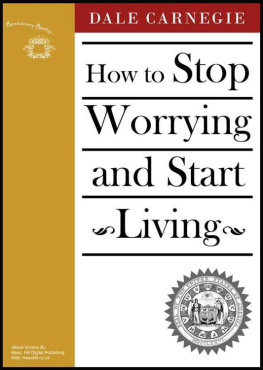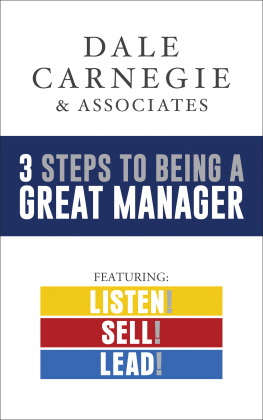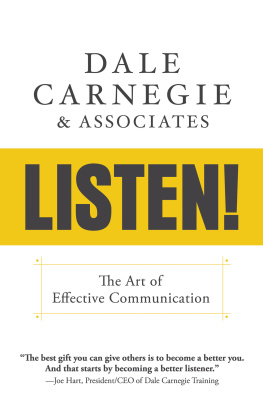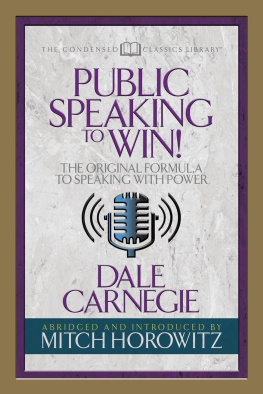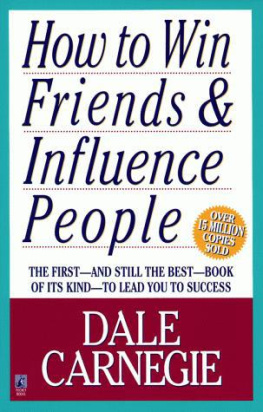Dale Carnegie - The Art of Public Speaking
Here you can read online Dale Carnegie - The Art of Public Speaking full text of the book (entire story) in english for free. Download pdf and epub, get meaning, cover and reviews about this ebook. genre: Romance novel. Description of the work, (preface) as well as reviews are available. Best literature library LitArk.com created for fans of good reading and offers a wide selection of genres:
Romance novel
Science fiction
Adventure
Detective
Science
History
Home and family
Prose
Art
Politics
Computer
Non-fiction
Religion
Business
Children
Humor
Choose a favorite category and find really read worthwhile books. Enjoy immersion in the world of imagination, feel the emotions of the characters or learn something new for yourself, make an fascinating discovery.
- Book:The Art of Public Speaking
- Author:
- Genre:
- Rating:5 / 5
- Favourites:Add to favourites
- Your mark:
- 100
- 1
- 2
- 3
- 4
- 5
The Art of Public Speaking: summary, description and annotation
We offer to read an annotation, description, summary or preface (depends on what the author of the book "The Art of Public Speaking" wrote himself). If you haven't found the necessary information about the book — write in the comments, we will try to find it.
The Art of Public Speaking — read online for free the complete book (whole text) full work
Below is the text of the book, divided by pages. System saving the place of the last page read, allows you to conveniently read the book "The Art of Public Speaking" online for free, without having to search again every time where you left off. Put a bookmark, and you can go to the page where you finished reading at any time.
Font size:
Interval:
Bookmark:
CONCENTRATION IN DELIVERY
Attention is the microscope of the mental eye. Its power may be high or low; its field of view narrow or broad. When high power is used attention is confined within very circumscribed limits, but its action is exceedingly intense and absorbing. It sees but few things, but these few are observed "through and through" ... Mental energy and activity, whether of perception or of thought, thus concentrated, act like the sun's rays concentrated by the burning glass. The object is illumined, heated, set on fire. Impressions are so deep that they can never be effaced. Attention of this sort is the prime condition of the most productive mental labor.
--DANIEL PUTNAM, Psychology.
Try to rub the top of your head forward and backward at the same time that you are patting your chest. Unless your powers of cordination are well developed you will find it confusing, if not impossible. The brain needs special training before it can do two or more things efficiently at the same instant. It may seem like splitting a hair between its north and northwest corner, but some psychologists argue that no brain can think two distinct thoughts, absolutely simultaneously--that what seems to be simultaneous is really very rapid rotation from the first thought to the second and back again, just as in the above-cited experiment the attention must shift from one hand to the other until one or the other movement becomes partly or wholly automatic.
Whatever is the psychological truth of this contention it is undeniable that the mind measurably loses grip on one idea the moment the attention is projected decidedly ahead to a second or a third idea.
A fault in public speakers that is as pernicious as it is common is that they try to think of the succeeding sentence while still uttering the former, and in this way their concentration trails off; in consequence, they start their sentences strongly and end them weakly. In a well-prepared written speech the emphatic word usually comes at one end of the sentence. But an emphatic word needs emphatic expression, and this is precisely what it does not get when concentration flags by leaping too soon to that which is next to be uttered. Concentrate all your mental energies on the present sentence. Remember that the mind of your audience follows yours very closely, and if you withdraw your attention from what you are saying to what you are going to say, your audience will also withdraw theirs. They may not do so consciously and deliberately, but they will surely cease to give importance to the things that you yourself slight. It is fatal to either the actor or the speaker to cross his bridges too soon.
Of course, all this is not to say that in the natural pauses of your speech you are not to take swift forward surveys--they are as important as the forward look in driving a motor car; the caution is of quite another sort: while speaking one sentence do not think of the sentence to follow. Let it come from its proper source--within yourself. You cannot deliver a broadside without concentrated force--that is what produces the explosion. In preparation you store and concentrate thought and feeling; in the pauses during delivery you swiftly look ahead and gather yourself for effective attack; during the moments of actual speech, SPEAK--DON'T ANTICIPATE. Divide your attention and you divide your power.
This matter of the effect of the inner man upon the outer needs a further word here, particularly as touching concentration.
"What do you read, my lord?" Hamlet replied, "Words. Words. Words." That is a world-old trouble. The mechanical calling of words is not expression, by a long stretch. Did you ever notice how hollow a memorized speech usually sounds? You have listened to the ranting, mechanical cadence of inefficient actors, lawyers and preachers. Their trouble is a mental one--they are not concentratedly thinking thoughts that cause words to issue with sincerity and conviction, but are merely enunciating word-sounds mechanically. Painful experience alike to audience and to speaker! A parrot is equally eloquent. Again let Shakespeare instruct us, this tune in the insincere prayer of the King, Hamlet's uncle. He laments thus pointedly:
My words fly up, my thoughts remain below: Words without thoughts never to heaven go.
The truth is, that as a speaker your words must be born again every time they are spoken, then they will not suffer in their utterance, even though perforce committed to memory and repeated, like Dr. Russell Conwell's lecture, "Acres of Diamonds," five thousand times. Such speeches lose nothing by repetition for the perfectly patent reason that they arise from concentrated thought and feeling and not a mere necessity for saying something--which usually means anything, and that, in turn, is tantamount to nothing. If the thought beneath your words is warm, fresh, spontaneous, a part of your self, your utterance will have breath and life. Words are only a result. Do not try to get the result without stimulating the cause.
Do you ask how to concentrate? Think of the word itself, and of its philological brother, concentric. Think of how a lens gathers and concenters the rays of light within a given circle. It centers them by a process of withdrawal. It may seem like a harsh saying, but the man who cannot concentrate is either weak of will, a nervous wreck, or has never learned what will-power is good for.
You must concentrate by resolutely withdrawing your attention from everything else. If you concentrate your thought on a pain which may be afflicting you, that pain will grow more intense. "Count your blessings" and they will multiply. Center your thought on your strokes and your tennis play will gradually improve. To concentrate is simply to attend to one thing, and attend to nothing else. If you find that you cannot do that, there is something wrong--attend to that first. Remove the cause and the symptom will disappear. Read the chapter on "Will Power." Cultivate your will by willing and then doing, at all costs. Concentrate--and you will win.
QUESTIONS AND EXERCISES
1. Select from any source several sentences suitable for speaking aloud; deliver them first in the manner condemned in this chapter, and second with due regard for emphasis toward the close of each sentence.
2. Put into about one hundred words your impression of the effect produced.
3. Tell of any peculiar methods you may have observed or heard of by which speakers have sought to aid their powers of concentration, such as looking fixedly at a blank spot in the ceiling, or twisting a watch charm.
4. What effect do such habits have on the audience?
5. What relation does pause bear to concentration?
6. Tell why concentration naturally helps a speaker to change pitch, tempo, and emphasis.
7. Read the following selection through to get its meaning and spirit clearly in your mind. Then read it aloud, concentrating solely on the thought that you are expressing--do not trouble about the sentence or thought that is coming. Half the troubles of mankind arise from anticipating trials that never occur. Avoid this in speaking. Make the end of your sentences just as strong as the beginning. CONCENTRATE.
WAR!
The last of the savage instincts is war. The cave man's club made law and procured food. Might decreed right. Warriors were saviours.
In Nazareth a carpenter laid down the saw and preached the brotherhood of man. Twelve centuries afterwards his followers marched to the Holy Land to destroy all who differed with them in the worship of the God of Love. Triumphantly they wrote "In Solomon's Porch and in his temple our men rode in the blood of the Saracens up to the knees of their horses."
History is an appalling tale of war. In the seventeenth century Germany, France, Sweden, and Spain warred for thirty years. At Magdeburg 30,000 out of 36,000 were killed regardless of sex or age. In Germany schools were closed for a third of a century, homes burned, women outraged, towns demolished, and the untilled land became a wilderness.
Next pageFont size:
Interval:
Bookmark:
Similar books «The Art of Public Speaking»
Look at similar books to The Art of Public Speaking. We have selected literature similar in name and meaning in the hope of providing readers with more options to find new, interesting, not yet read works.
Discussion, reviews of the book The Art of Public Speaking and just readers' own opinions. Leave your comments, write what you think about the work, its meaning or the main characters. Specify what exactly you liked and what you didn't like, and why you think so.

